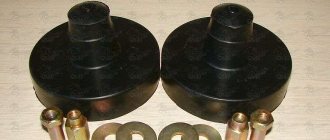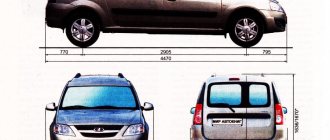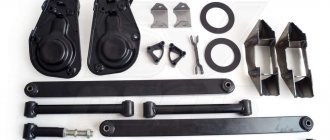Vehicle clearance is a geometric value that is measured between the lowest body point and the road surface. If we consider the Russian-made Lada Largus station wagon, then this model has a ground clearance of 145 mm. These data were obtained under conditions of the vehicle being fully loaded. During the tests, the ground clearance turned out to be identical both for the 5-seat version and for the minivan, which has 7 seats in the cabin. Let's look at why this happens further.
Where is the starting point for determining the clearance in Largus? Could this be crankcase protection?
The question here is which body element in the universal model we are considering should be considered the lowest point. In passenger cars, including the Lada Largus, when determining ground clearance, all suspension elements that are located below the level of the hubs are neglected. If they had not been inclined to such a decision, the ground clearance would have been different.
The figure shows an image of the bottom of the Lada Largus model in the “van” or “station wagon” version. The motor is protected here using a metal panel. It is from its surface that the clearance value is calculated. Parts that are below the level of motor protection cannot be found in the figure.
Characteristics – Largus Cross 5 seats
Download technical specifications
1.6 l 16-cl., 5MT, 106 hp
- 4 x 2 / front
- anterior transverse
- station wagon / 5
- 5
- 4470 / 1756 / 1682
- 2905
- 1461 / 1466
- 170
- 560 / 2350
- petrol
- electronically controlled fuel injection
- 4, in-line
- 1596
- 106 / 78 / 5800
- 148 / 4200
- gasoline, min 95
- 165
- 13,5
- 11,5
- 7,5
- 9,0
- 1260…1370
- 1750…1850
- 650
- 1300
- 50
- 5MT
- 4,2
- independent, MacPherson type, spring, with anti-roll bar
- semi-independent, lever, spring
- rack and pinion
- 205/55 R16 (91, H/V)
Fuel consumption data is determined under standardized conditions using special measuring equipment, in accordance with the requirements of GOST R41.101–99 (UNECE Rules No. 101). Used to compare cars from different automakers. They are not an operational standard.
minsk-lada.by
Lada Largus technical specifications
Many potential car buyers are interested in the main technical characteristics of the Lada Largus. The car is a clone of the Dacia Logan MCV car of the Renault-Nissan alliance, which has gained some popularity in Europe, redesigned for domestic operating conditions. The Lada Largus model has similar technical characteristics. The car body type belongs to the category of high-capacity station wagons, and the dimensions of the Lada Largus allow the car to be classified both as spacious family cars and ultra-compact commercial vans.
Return to contents
Main body dimensions
The dimensions of the Lada Largus car differ little from those of its competitors, such as Fiat Doblo, Renault Kangoo, Peugeot Partner, Citroen Berlingo, Skoda Roomster, Volkswagen Caddy, Ford Connect Transit. The overall dimensions (body length/width/height) of the Peugeot Partner are 4380/1810/1800 mm, and the body dimensions of the Lada Largus are approximately the same.
Main dimensions of Lada Largus:
- length - 4470 mm;
- width - 1750 mm;
- height (including the dimensions of the roof rails) - 1670 mm;
- car base - 2900 mm;
- front track - 1469 mm;
- rear track - 1466 mm;
- front overhang - 795 mm;
- rear overhang - 770 mm;
- ground clearance under the lowest point of the engine - 145 mm;
- turning radius - 5.62 m.
The Lada Largus body has a hinged rear door. This ensures easy access to the luggage compartment, even in limited parking spaces. The left rear door leaf is noticeably wider than the right one, and the design of the car allows only it to be opened when loading and unloading.
Consumers care whether the Largus body is galvanized. It is known that all steel panels of the machine are double-sided galvanized.
Return to contents
Station wagon engine
The car comes with an 8-valve or 16-valve 4-cylinder fuel-injected engine with multiport fuel injection. The volume of these engines is 1598 cm3; cylinder diameter - 79.5 mm; piston stroke - 80.5 mm; compression ratio - 9.8. The 8-valve engine produces 90 horsepower and a torque of 128 N∙m. The maximum speed of Largus, equipped with such an engine, is 158 km/h, and acceleration to 100 km occurs in 13.4 s. The 16-valve engine is slightly more powerful, it produces 105 horsepower and a maximum torque of 148 N∙m. In this version, the maximum speed is 165 km/h, acceleration to 100 km is 11.8 s.
Lada Largus engines consume gasoline with an octane rating of 95. The car complies with Euro 4 standards. Lada Largus fuel consumption per 100 km in the combined cycle for a 5-seater version and a 16-valve engine is 11.5 liters, and on the highway - 7.6 liters per 100 km.
Ground clearance of Lada Largus: real indicators
The Russian station wagon Lada Largus was created by our domestic engineers in the image of the French car Dacia Logan MCV. However, the Russian car has a fairly thoroughly redesigned mechanical part, which is adapted to Russian roads.
Production
Lada Largus was put into production in the spring of 2012 in the city of Tolyatti, and it has been on sale since the summer of the same year. The prototype of the Lada Largus is the French car Dacia Logan MCP, produced on assembly lines in Romania. Despite their external similarity, these two cars also have significant differences. The shape of the Lada Largus radiator grille is much more refined and modern.
Lada Largus belongs to the “B” class of station wagon cars. This car is considered a family car and is therefore highly sought after.
The technical characteristics of the Lada Largus are as follows:
Power units
The Lada Largus has two power units, with a nominal volume of 1.6 liters each. Due to the different number of valves, the power of one is 84 horsepower, and the second is 105 horsepower. With. Accordingly, there are 8 and 15 valves.
Power unit with a power of 84 hp. less economical, fuel consumption per 100 km is 7.7 liters, in urban conditions 12.5 liters. Accordingly, 105 l. With. “eats” 7.5 liters per 100 km, and 11.5 liters in the city. The more expensive option will soon pay for itself thanks to significant fuel savings.
All modifications of Largus have the same number of cylinders - 4 pieces and the same maximum torque of 148 N*m and 3750 rpm.
type of drive
Lada Largus has a front-wheel drive type, which is no different from other domestic cars, and it has a 5-speed manual transmission. The box does not blindly repeat its French counterpart. It was significantly changed by domestic engineers, ideally adapting it to domestic routes. The gear ratios are very different. Lada Largus has a very high ground clearance - 145 mm, which adds confidence to this car on the road. All the unevenness of Russian roads is leveled out by this parameter, which is useful for our roads.
Ground clearance or ground clearance is the distance between the ground and the lowest point of the center of the car. Often, foreign manufacturers fix the ground clearance of their cars without load. Lada Largus is a 2006 Dacia Logan MCV station wagon adapted for the domestic market. Dacia has a ground clearance of 155-160 mm, our station wagon has undergone changes in this parameter.
Salon
Today, the market offers several variants of this wonderful vehicle - one cargo (F90) and two passenger (R90).
- Passenger with 5 seats and trunk volume of 560 liters.
- Passenger with 7 seats, trunk volume is reduced to 135 liters. If you remove or fold the 3rd row seats, you can regain the increase in trunk volume.
- The cargo van impresses with a luggage compartment of 2540 liters. The disadvantage of this design is the presence of only 2 seats.
LADA Largus Cross – the long-awaited continuation of the station wagon
What kind of person would refuse to relax in nature? This car is for those who like to quickly be at the dacha or on a picnic, while actively using the car. The crossover is distinguished from the station wagon by its brighter exterior design, the presence of plastic linings on the bumpers, sills and wheel arches, film-covered door frames, and larger tire sizes. The interior is also multifunctional, like a station wagon, but aesthetically more original and bright. The use of orange leather inserts in the shoulder area and seam trim of the same color adorn all seats. Continuing the color theme is the center console trim and door trim inserts in the same orange color. The interior is somewhat aggressive, but interesting. There are heated seats and air conditioning. And the interior is completed with a signature touch - the inscription “Largus Cross”.
- Cross is a car with the same spaciousness, with a reliable suspension and a high-torque engine.
- Cross is comfort and capacity.
- Cross is the best price in its class.
- Add to this the increase in ground clearance and we get the amazing cross-country ability of the Cross.
- Let's not forget about the safety of the Cross - two front airbags, an anti-lock braking system, additional safety bars, special seat mounts for children and seat belts.
Largus translates as generous, we can agree with this, because this budget car combines the features of both a commercial and passenger car. The owners' reviews are wonderful. And Largus Cross is also ideal for traveling, which is why this car has won universal recognition.
Production
Lada Largus was put into production in the spring of 2012 in the city of Tolyatti, and it has been on sale since the summer of the same year. The prototype of the Lada Largus is the French car Dacia Logan MCP, produced on assembly lines in Romania. Despite their external similarity, these two cars also have significant differences. The shape of the Lada Largus radiator grille is much more refined and modern.
Lada Largus belongs to the “B” class of station wagon cars. This car is considered a family car and is therefore highly sought after.
The technical characteristics of the Lada Largus are as follows:
Prices and options
The manufacturer offers the new Lada Largus Cross in the “Lux” configuration. It includes the following items:
- immobilizer;
- on-board computer;
- rear seats with headrests;
- fog lights;
- driver and front passenger airbags;
- ABS;
- leather steering wheel;
- second-row split seat;
- split backrest for the third row (on the 7-seater version);
- power steering;
- electric windows on all doors;
- air conditioner;
- central locking with remote control;
- audio system with MP3, FM, USB, Bluetooth and 4 speakers;
- electrically adjustable and heated exterior mirrors;
- heated front seats;
- roof rails and all-terrain body kit;
- door handles and mirrors in body color;
- 16-inch alloy wheels;
- “dokatka” by 15 inches;
The price of the Lada Largus Cross in this configuration is 553,000 and 573,000 rubles for modifications with 5 and 7 seats, respectively.
Control dimensions of Lada Largus body geometry / Lada Largus
Dimensions of openings and clearances of mating parts of the LARGUS body
| A | B | IN | G | D | E | AND | 3 |
| 1380 ± 5 | 930 ± 4 | 1280 ± 5 | 1155 ± 15 | 925 ± 5 | 975 ± 5 | 1110 ± 5 | 610 ± 3 |
| AND | TO | L | M | N | ABOUT | P | |
| 795 ± 3 | 735 ± 3 | 1530 ± 5 | 800 ± 5 | 1380 ± 4 | 1030 ± 3 | 1140 ± 3 |
Mounting points for suspensions on the body
1 — front subframe mounting points; 2 — mounting points for the shock absorber strut; 3—rear subframe mounting points; 4 — guide holes of the front spar; 5 — front guides of the rear spar; 6 — guide holes for mounting the rear suspension; 7 — rear suspension mounting holes; 8 - holes for mounting the rear shock absorber; 9 — rear guide holes of the rear spar.
Scheme for measuring interaxial dimensions
Largus Van interior
The interior of the cargo-passenger Largus is designed to seat two people (driver and one passenger) and is equipped with seats with mechanical adjustment in four directions. What else can be noted in the car interior:
the steering column is adjustable, but only in height;
the chairs are generally comfortable, but with insufficiently rigid backrests;
the ceiling in the cabin is high, there is more than enough headroom;
the instrument cluster has speedometer and tachometer dials on the sides, a small monochrome display occupies the middle position;
almost all control elements (keys for power windows, central locking, emergency lights, handles for air conditioning and heating systems) are located centrally on the dashboard or on the center console, there is also a 12-volt socket;
steering wheel – three-spoke, without keys;
there is no interior mirror;
The interior door panels are made of hard plastic.
The seat heating buttons are installed on the sides of the seats themselves, on the door side, but in the poorest configuration they will not be there, as well as the ESP buttons. The air ducts on the dashboard are round in shape; in appearance they resemble deflectors from a Gazelle.
Standard configurations and prices
The Largus Van does not have a lot of optional equipment, although it is offered in several trim levels:
“Standard” (factory index - FS035-50-ACA);
"Standard Start" (FS035-50-AC8);
"Norma" (FS035-51-ACB);
"Norma Audio" (FS035-51-ACG);
“Norma Comfort” (FS035-51-AC7 and FS045-51-ACA);
"Norma Comfort CNG".
Engine VAZ-21129 106 l. With. Available only in Norma Comfort and Norma Comfort CNG (with LPG) equipment, although the “Norma Comfort” modification is also available with an 87-horsepower engine (FS035-51-AC7). The basic Standard version includes options:
driver airbag;
EBD and ABS systems;
immobilizer;
light tinting of windows;
audio training.
In all versions, the Largus Van is equipped with a full-size R15 spare wheel with a steel disk, the ERA-Glonass system, and fabric seat upholstery. The price of a base car in July 2022 is 560.9 thousand rubles, the Standard Start version (already with power steering) is 575.9 thousand rubles.
Technical characteristics of Largus van. Lada Largus van body length
Dimensions of the Lada Largus 2018 van
Dimensions of the Lada Largus van
Russian sales of Lada Largus began in July 2012. The car is available in 7- and 5-seater versions, as well as in a van body.
The car has the following technical characteristics: 8 and 16 valve petrol engine with a volume of 1.6 liters and a power of 87 hp. and 106 hp
The Lada Largus 2022 van has dimensions: 4470 mm in length, 1750 mm in width and 1650 mm in height. The volume of the luggage compartment is 2540 liters.
New video review and test drive of the van:
The station wagon consumes only about 8.1 liters per 100 km in the combined cycle
Tire sizes are 185/70R14, 185/65R15.
See vehicle specifications and prices here.
Technical characteristics of Largus van / MirAvto Lada
Technical characteristics of the Lada Largus station wagon in numbers. For ease of loading, the rear door leaves are fixed in 3 positions 40, 90 and 180 degrees. To properly secure the load, there are 6 mounting points, allowing you to secure even small items. The Lada Largus is equipped with the well-known Renault 1.6 16 valve engines with a power of 102 hp. and 8 valve with a power of 87 hp, only 5 manual transmissions are available. The van's load capacity is 800 kg and the trunk volume is 2540 liters. In the crash test, Largus scored 3 stars out of 5.
«>
Appearance
The difference between the LADA Largus Cross and the previously mentioned basic station wagon is the installation of more aggressive exterior elements. Thus, special protective plastic linings appeared on bumpers, door sills and wheel arches. This solution is used on many similar models. This is a really good way to protect the car body from damage.
Higher ground clearance is another “trick” of the Largus Cross modification. The car is equipped with unpainted bumpers. A black film is used on the door frames, which makes the design of the model more exclusive. We also note the use of 16-inch wheels with corresponding tires, which are not available to buyers of the regular Lada Largus station wagon.
Asceticism
The only obvious drawback of the Lada-Largus is its deliberate asceticism. The interior of the car has not changed at all since the creation of the first generation Renault Logan. This model contains only the bare minimum. But many car enthusiasts today want to see some additional frills in their cars, such as heated seats and mirrors, modern multimedia, and electronic assistants. The impressive dimensions of the Lada-Largus van, heated front seats, a single-din radio, an ABS system and rear parking sensors are all that are included as standard. The car is equipped with only two airbags and manual air conditioning.
Many cars are created with the aim of setting speed records and most of them captivate with their stylish and original design. The Lada-Largus van, with a body size that allows it to transport large items, was invented specifically for work and family. The car will be able to drive where sports cars with low clearance cannot move. At the same time, drivers will look at the Lada-Largus with real love, because only a working car is considered truly beautiful.
Interior
As soon as you get into the salon, you immediately see that nothing major has been changed in the interior. The driver's seat is still comfortable and can accommodate drivers of all sizes and shapes. In some configurations, the chair may have adjustable lumbar support and a steering column with settings in the vertical plane. To set the seat position, you can use simple adjustments.
The high seating position improved visibility. So, when you sit in the front seat, the view is almost perfect. Even the very wide A-pillars do not interfere with your ability to look at the road situation.
The front panel, as well as the electronic equipment, remains the same. Among the features is the horn. It is set in French, and for Russians this is a little unusual. Its button is now at the end of the right steering column toggle switch.
Station wagon body and dimensions
The body of this car is not VAZ’s own design. Lada Largus 5 seats is a modified Largus model, which, in turn, received the appearance from the French car Renault Logan. This decision was made due to the fact that Logan has been going to Russia in recent years. Therefore, the B0 body platform, already well known to domestic consumers, was chosen as the foundation for the creation of Largus. Lada Largus Cross 5 seats - a modernized version with larger wheels for better off-road traction.
The cross version has the following dimensions:
- 4.47 m long;
- 1.756 m in width;
- 1,682 m high;
- ground clearance 0 17 m;
- the track width of the front wheels is 0.05 m less than the rear (1.461 m versus 1.466 m);
- trunk volume 560 liters.
The car is front-wheel drive, that is, the front pair of wheels is driving. The engine is located in front across the hood. The body structure is classic, proven over the years by Renault. The lines are straight, restrained, and there are neat transitions from one element of the exterior to another.
The ground clearance has been increased compared to the standard station wagon to ensure better cross-country ability on rough terrain. The trunk in the Largus station wagon for 5 seats has an impressive volume of 560 liters without folding the rear seats. When the passenger seats are folded, the trunk becomes many times larger and makes the Largus a full-fledged van. The boot mat for the Lada Largus is not included.
Salon
Today, the market offers several variants of this wonderful vehicle - one cargo (F90) and two passenger (R90).
- Passenger with 5 seats and trunk volume of 560 liters.
- Passenger with 7 seats, trunk volume is reduced to 135 liters. If you remove or fold the 3rd row seats, you can regain the increase in trunk volume.
- The cargo van impresses with a luggage compartment of 2540 liters. The disadvantage of this design is the presence of only 2 seats.
Operation of electric windows when the ignition is turned off
Quite often, Lada Largus owners complain that the power windows do not work when the ignition is off or the key is in ACC. This can be corrected by a small modification of the car's electrical circuit.
Video on how to make power windows work on a Lada Largus without ignition:
To perform this work, you must remove the interior fuse box.
It is worth recalling that this modification, like the previous one, must be carried out with the battery disconnected!
First of all, you need to find fuses F13–F16, which are responsible for the functionality of the ESP, after which, carefully bending the terminal clamps and pulling out the plastic clip, remove the power supply strip.
The removed strip is divided transversely into two parts. The first part returns unchanged to the place corresponding to fuses F15 and F16.
A thick copper wire with a cross-section of approximately 1.5 squares is soldered to the remaining second half, which, in turn, is soldered (screwed) to any thick wire that receives power when the key is turned to the ACC position (or has constant voltage - as you like).
The modified half of the strip is installed in place, the mounting points are isolated, the fuses are returned to their place and reassembly is carried out in the reverse order of disassembly.
Hello, dear friends! Today we will be a little creative, reflect and prepare the ground for further action. And why all? Yes, because the topic of our conversation will be tuning the Lada Largus.
This is a popular car in Russia and the CIS countries, which is closely associated with the French auto company Renault and received a lot from it. Therefore, the current Lada Largus compares favorably with outdated domestic station wagons.
Yes, Largus is a full-fledged station wagon or van, as some are used to saying. Even the presence of the prefix Cross in the name does not make it a full-fledged crossover.
I would like to discuss with you possible improvements for the Lada Largus, and also separately tell you a little about the Cross version. If you are ready, then we can begin.
Linear dimensions of the cargo compartment of the Lada Largus van
All the sizes you need to know are shown in the photo. The van doors here are fixed at an angle of 90 degrees, but they can be opened all the way to 180. They are fixed in either of the two positions.
Luggage compartment of a Largus van
Let's list everything that is marked in the figure:
- The greatest height of the opening is 92 cm;
- Opening width – 108 cm;
- The distance “from arch to arch” is 96 cm;
- The distance from the edge of the threshold to the partition is 194 cm.
If you lay sheets diagonally, the width of the sheet should be less than 130 cm.
In fact, the maximum lifting capacity exceeds a ton. It all depends on the road conditions and driving style.
How to increase ground clearance on Lada Largus?
There are several ways to increase the ground clearance of the Lada Largus. The main ways are:
1. Installation of larger diameter wheels and higher tires. 2. Installation of special spacers. 3. Installation of larger shock absorbers and springs.
The first method is one of the simplest, but at the same time the most expensive in terms of finances. But this method also has a significant drawback - a small percentage increase in ground clearance. For example, from the factory the standard tire size for Lada Largus is 185/65 R15. We can increase the height of the rubber, for example, by 5 units. Those. take tires 195/70 R15. In the first case, our tire height was 120 mm, and in the second - 136 mm. In fact, we will increase our ground clearance by about 16 mm. Immediately such an increase in height is quite good, but there is one caveat - tires with a larger diameter and height can touch body parts or wheel arches when turning. The speedometer may also not work correctly, since it is calibrated from the factory for a certain wheel size. And a wheel with a larger diameter will make fewer revolutions, and accordingly the speedometer will start to lie.
The second method is also not complicated, and the money won’t be very expensive. You just buy spacers for the shock absorbers at the store and install them.
Spacers are sold in different sizes. The design turns out to be quite reliable and safe. However, if you have to re-register such a car with the traffic police, it is unlikely to succeed - inspectors will be sent to fix the installation of spacers. By law, such a modification is a change in the design of the vehicle.
The third method is the most competent from a technical point of view. Its essence lies in the selection of increased springs and extended shock absorbers for the car. In terms of cost, it is approximately equal to replacing tires, since good struts and springs cannot be cheap.
What is vehicle clearance?
As a rule, when buying a car, few people think about what the car’s ground clearance is. In the meantime, this parameter is an important aspect that requires sufficient attention.
High ground clearance on passenger cars is indispensable for off-road travel, where there are many potholes and potholes. However, even in urban conditions, your car may need significant cross-country ability to overcome the resulting obstacle course. This means that a low ground clearance is, of course, more prestigious, but not comfortable enough to operate.
So why is increasing ground clearance so important?
Ground clearance is the distance between the ground surface and the lowest part of the car body. However, sometimes it is quite difficult to evaluate this parameter, since there are many structural elements located on the bottom of the car. This means that to determine this distance, it is necessary to select several control points at which measurements will be taken.
It is necessary to increase the ground clearance primarily in order to protect the front bumper. He takes on all the challenges of harsh urban conditions. Most often, the bumper becomes a means of measuring the height of roadside curbs. The standard ground clearance for passenger cars is approximately 14-20 cm, and for SUVs and minivans - up to 35 cm inclusive. Having at least basic knowledge of what car clearance is, you can have a much better idea of how to choose the right car. If you are simply concerned about the safety of your car, you can install a parking sensor system.
An equally important control point is the oil pan, which is located under the hood and represents the most protruding parts of the bottom. For many passenger cars, the ground clearance is only from 12 to 17 cm, which, you see, is quite small for active use in difficult conditions
Consequently, the question of what vehicle clearance is becomes decisive for such cases.
For jeeps and SUVs this value is slightly larger, but you also need to pay attention to it if you live outside the city or travel there often
Recommendations on how to protect the underbody of a car, as well as what ground clearance is and how to increase it, can only be given by qualified specialists. They also advise installing additional inserts made of carbon fiber or metal.
The third control element is the exhaust system parts. This structural part of the car serves as a specific protection of the environment from exhaust gases, which pollute the atmosphere and, therefore, worsen the living conditions of people.
How to be? First, you should carefully study the features of your car, identify its strong and weak parts. Then, if it is really necessary, you need to carefully understand all the ways to increase ground clearance. Among the most common are the following:
- increasing the diameter of the rims or tire profile;
- spring replacement;
- installation of raising spacers.
However, you should always take into account that changing standard parameters leads to changes in the rules for operating the car.
Unfasten the partition or part of it
The partition separating the body and the cabin consists of two halves. They can be removed separately. Both parts are screwed to the body with screws designed for a 13mm key size. Of course, you need a socket wrench.
Screws 1 were hidden under the casing
The four screws on the left and right are located on the cab side. And to unscrew them, remove the casing.
All actions with cladding
The left part of the septum is removed after the right. To remove only the left half, first remove both, and then mount the right sash back. Based on this, immediately decide where you will remove the trim - only on the right or on both sides.
So, let's start dismantling the trim: you need to remove the seat belt (key “17”), and then unscrew one self-tapping screw. A Torx T20 wrench is suitable for the self-tapping screw.
Two parts “1” prevent the removal of casing “2”
It is necessary to unscrew all the parts numbered 1. And the casing will have to be removed, overcoming the resistance of the clamps.
One of the most successful new products on the domestic market is a real pride of the manufacturer
The interior decoration of the cabin is extremely attractive and non-trivial. The seat covers feature contrast stitching and bright orange accents. The dashboard is also finished in orange, making the station wagon look like a sports car from the inside. The driver and front passenger seats have an orthopedic frame, high-quality lateral support and height adjustment. The trunk in standard condition has a volume of 560 liters, with the rear seats folded down - a serious 2350 liters.
Lada Largus 5 Cross is available only in luxury configuration. For an extremely affordable price, you can buy a car with the necessary equipment for comfort and safety on the road. The official dealer of the brand in Moscow, Inkom Auto, offers a model with an engine capacity of 1.6 liters, a manual transmission and many useful improvements that the new station wagon can boast of. All kinds of body shades are available at manufacturer prices.
Great car. I am very pleased with the purchase, I made no mistake with my choice. Excellent handling and maneuverability. Dynamic, accelerates well. Great brakes. Light steering wheel (you can steer with one finger). Economical. Low gasoline consumption, even in winter when starting the car from the factory several times a day and turning on the heated seats frequently. High ground clearance, which means there are fewer problems with parking, especially in winter. Comfortable salon.
Vyacheslav, Volgograd
Lots of impressions... We're waiting for winter... then I'll write back... I'll tell you my impressions after 1 month of owning a Mitsubishi Fich 2013. automatic SVT, minimal equipment. I won’t list why exactly he is - everyone decides for themselves what they need according to their budget and desires
The only important thing is whether the expectations of buying a new car were worth it - the expectations of driving and handling. I’ll say this - the wait was worth it and the impressions changed to “if only I’d take it too”
Engine
Ground clearance is the distance from the lowest point in the center of the car body to the ground. However, the manufacturer of Lada Largus Cross measures the ground clearance as it suits him. This means that the distance from the shock absorbers, engine oil pan or muffler to the asphalt may be less than the stated ground clearance.
An interesting point: car buyers pay special attention to ground clearance, because in our country good ground clearance is a necessity; it will save you from headaches when parking to curbs. The ground clearance height of the Lada Largus Cross ranges from 170 to 195 mm
But be careful when going on vacation or returning with shopping: a loaded car will easily lose 2-3 centimeters of ground clearance
The ground clearance height of the Lada Largus Cross ranges from 170 to 195 mm. But be careful when going on vacation or returning with shopping: a loaded car will easily lose 2-3 centimeters of ground clearance.
If desired, the ground clearance of any car can be increased using spacers for shock absorbers. The car will become taller. However, it will lose its former stability at high speeds and will lose greatly in maneuverability. The ground clearance can also be reduced; for this, as a rule, it is enough to replace the standard shock absorbers with tuning ones: the handling and stability will immediately please you.
Total
This article provides basic information on ways to increase vehicle clearance. If you decide to upgrade your suspension, be sure to look for information specific to your car. Try to pay less attention to marketing articles, and more to motorist forums, where people share practical experience in using certain modernization means. In conclusion, I would like to say that the fight against bad roads is not limited to just increasing the ground clearance
Based on our road realities, it is necessary to pay special attention to the car body, driver comfort and safety. AutoPortal will tell you what else you can do with your car in the next article.
Engine tuning
Many motorists want to make their engines better and more powerful. This is why the tuning and modification procedure is carried out. For engines such as the Lada Largus, there are two options for modification - mechanical and software tuning. But, most vehicle owners prefer to make a second modification.
Soldering the chip into the ECU
In order for everything to work out and not have to often stand in line to see an electrician-programmer, the ideal option is to install a chip in the engine control unit. After this, the software is installed, and subsequently the chip regulates the operation of all necessary systems.
How is the actual process of introducing a chip into the “brains” of a vehicle carried out? This procedure is quite difficult and requires advanced knowledge in radio electronics, as well as automotive electrical engineering. So, this process is best left to specialists.
The chip itself can be mounted (soldered) directly into the electronic engine control unit or at an intermediate stage, depending on the purpose of the equipment.
Recently, controllers and various chips that motorists install into their cars themselves have become popular. As practice shows, this does not always have a positive effect on the performance of automotive systems. Experts and auto electricians recommend that before installing anything in a vehicle, consult with professionals and weigh all the pros and cons.
Brain firmware
The second option is chipping the standard engine control unit. Motorists and craftsmen divide this type of tuning into three parts:
- Firmware to reduce fuel consumption.
- Firmware to increase power.
- Balanced firmware.
As practice shows, most owners of Largus engines use the option with reduced consumption. It is worth understanding that by reducing the flow rate, the dynamic characteristics are also reduced. Thus, power units may respond late to changes in the position of the accelerator pedal, which in turn does not have a very good effect when overtaking.
It is worth noting that the chipping procedure must be trusted to professionals. Only they will tell you what type of tuning is most suitable for the engine and will take into account the wishes of the motorist.
dimensions and dimensions in centimeters, length, width
LADA Largus has long won the sympathy of Russian car enthusiasts
Drivers often pay attention to the large trunk volume of the Lada Largus, which is considered the main advantage of this car. Domestic cars also cope well with another task - providing inexpensive and comfortable travel on modern roads
These two aspects and the ability to accommodate a large number of passengers allowed the car, produced at the Russian AvtoVAZ, to become a popular model in the CIS countries.
The dimensions of the Largus trunk depend on the body variation, it can be:
Each car variation has its own luggage compartment volume. In a station wagon designed for 5 seats, the volume of this compartment is 700 liters. But the owner of this model can transport a large load. In the Lada Largus station wagon, the trunk volume can be increased to 1500–1800 liters by removing the second row of seats - a three-seater sofa. With the seats folded down, the station wagon's luggage compartment volume increases to 2,350 liters.
Power units
The Lada Largus has two power units, with a nominal volume of 1.6 liters each. Due to the different number of valves, the power of one is 84 horsepower, and the second is 105 horsepower. With. Accordingly, there are 8 and 15 valves.
Power unit with a power of 84 hp. less economical, fuel consumption per 100 km is 7.7 liters, in urban conditions 12.5 liters. Accordingly, 105 l. With. “eats” 7.5 liters per 100 km, and 11.5 liters in the city. The more expensive option will soon pay for itself thanks to significant fuel savings.
All modifications of Largus have the same number of cylinders - 4 pieces and the same maximum torque of 148 N*m and 3750 rpm.
Ground clearance (ground clearance) of Lada Largus Cross: real indicators
Lada Largus Cross was created by a domestic manufacturer with the goal of giving an ordinary station wagon a similarity to an SUV.
Significant innovations in Lada Largus
In order to understand the scale of the changes that have occurred in the car, we need to draw a parallel between the cross and other equally powerful engines that are identical in configuration to the Largus. So:
- appearance: in Largus cross it has not changed much, but it is slightly taller than the donor. You can see unpainted bumpers with gray inserts on the bottom and black wheel arches and sills. The wheel diameter has increased from 15 to 16 inches. The Cross acquired “prestige” status due to alloy wheels instead of stamped ones. The interior has also not changed, only the upholstery. The crossover has intersecting lines, and there are also gray plastic inserts on the doors. There is another option for interior colors - with bright orange inserts instead of gray ones;
- The Lada Largus Cross is 35 kg heavier than usual, the shock absorber rods and the springs themselves are longer. The plastic body kit adds brutality and protects the car’s paintwork from damage when driving over rough terrain;
- cross economy: the cross spends 1.4 liters more per kilometer in the city than a regular station wagon.
What is the advantage of the Lada Largus Cross
- The car is well equipped: there are electric mirrors and adjustments, heated seats, fog lights, good standard acoustics, power steering, air conditioning, standard metal engine protection, and much more. Sitting in the Lada Largus Cross, you will feel no worse than in any other foreign car. All this is due to the high functionality and equipment of the machine.
- The appearance is decent, much more interesting compared to other models. You can be pleased with alloy wheels with a radius of R16.
- The car has excellent power: with a weight of 350 kg and with two passengers, you will not feel any discomfort.
- Quite an energy-intensive suspension.
- Lada Largus Cross has a 16-valve 1.6 liter engine.
- The car itself is very roomy.
- The most important advantage of the Lada Largus Cross is its high ground clearance! Many car enthusiasts appreciated this: you won’t feel the holes, bumps and all the other delights of Russian roads; the bottom doesn’t touch the ground at all. The ground clearance is only 170 mm, but drivers say it feels like 200 mm.
What is clearance
Ground clearance is ground clearance, the distance from the bottom point of the body to the ground. The lower the clearance, the more stable the car is on the road, but high ground clearance also has advantages. For example, high cross-country ability of a car.
How to calculate the lowest ground clearance reference point? It's simple, you need to count from the crankcase protection to the ground. There are simply no details below.
The calling card of the Lada Largus Cross is its ground clearance. Since 2015, the car's ground clearance has been increased by as much as 25 mm! The domestic manufacturer replaced the springs, shock absorbers and other suspension elements, which increased the ground clearance by 15-20 mm, and also changed the wheel diameter from R15 to R16, so that the Largus Cross became as high as possible. An experiment with wheels added 5 mm to the car.
As we know, on the previous Lada Largus model, at full load, the ground clearance is 145 mm, and with curb weight - 175 mm.
But how much ground clearance is there on the Lada Largus with the cross prefix? The characteristics of the car indicate that when fully loaded the ground clearance is 170 mm, and without load it is more than 180, namely 210 mm! Moreover, it is the same for both a 5-seater and a seven-seater station wagon! This car is called a car for tourists.
But we need to be sure of this one hundred percent, so let’s inspect the bottom of this off-road version. We can immediately notice that the muffler is hidden in the tunnel, but if we compare it with the Kalina Cross, it is not so deep. We also see that they used more reliable and durable engine protection. So, we measure the clearance, and as a result we get 195 mm!
Reviews about the Lada Largus are as follows - it is the best car, it is comfortable and drives very smoothly both on the highway and off-road. You won't notice the difference! Have a nice ride!
van, 5 seats, photo and video
Ground clearance or ground clearance is the distance from the lowest point of the body to the ground. The Lada Largus has ground clearance, that is, the ground clearance is 145 mm. Moreover, this distance was measured when fully loaded. And it turned out to be the same for both the 5 and 7-seater station wagon! Let's try to figure it out further why this is so.
An ordinary Largus (not Cross) pulls the boat out of the water. Example on video.
The reference point for ride height is the crankcase protection
The question is what exactly is considered the lowest point. For all passenger cars, for example, everything located near the hubs is excluded from consideration. Otherwise, we would have to count the ground clearance from the ball joint housings. You understand what value the result would have.
Under the bottom of Largus with a 16-valve internal combustion engine
The picture above shows what the bottom of a Largus car (van or station wagon) looks like. The engine here is protected by a metal insert. From it, that is, from the crankcase protection, the clearance is measured. The parts located below cannot be found on the bottom.
Passenger version ground clearance
Shown here is a car body with a K4M engine (16 valves). Ground clearance for this version is 145 mm. It will be no less if we talk about any 8-valve engine (K7M or VAZ-11189).
Van ground clearance
By the way, the ground clearance of the Lada Largus van is the same as that of the two passenger versions (145 mm).
Van ground clearance is 145 mm
And the value was measured this way: the car was fully loaded. There were 4 passengers and a driver in the cabin, and the trunk also did not go unnoticed. The 7-seater version added two more passengers. In general, everything was fair.
Photo of Lada Largus ground clearance in various places of the body
Clearance at the front bumper point
Rear wheel clearance: threshold
Bottom clearance
Photo of the rear suspension with ground clearance
Fully loaded and standard curb weight – where did “155 mm” come from?
Studying the specifications of the Dacia Logan station wagon, you might be surprised: the ground clearance indicated in the documents is 155 mm! By the way, Logan MCV and Largus are the same model.
Dacia Logan MCV (station wagon)
The question remains which numbers should be trusted. And the answer is simple:
- AvtoVAZ carried out measurements at full load;
- Renault uses a different method - the body must be loaded to the “standard curb weight”.
Curb weight is the weight of the vehicle, as well as consumables and the driver. There is a small nuance here: if the documents indicate the tank volume as “40 liters”, but in reality it is 50, then they will fill it with exactly 40 liters of fuel. This technique is used by the Renault concern.
It turns out that if the cabin is designed for 7 or 5 seats, the ground clearance of the Lada Largus without loading will exceed 155 mm. The same applies to the van. Clearance can be increased.
Clarification for cross-version
The VAZ plant managed to make crossovers from ordinary Logan station wagons. The front suspension was modified, and the springs at the rear also had to be replaced. The tire size also changed: it was 185/65 R15, now it is 205/55 R16. As a result of all the changes, ground clearance has increased by 25 mm.
Here the clearance exceeds 180 mm
So, the value of ground clearance for the Largus Cross station wagon:
- Fully loaded – 170 mm;
- Without loading – more than 180 mm.
Let us remind you that the value is measured as the distance from the ground to the crankcase protection.
If you use tires and wheels of standard diameter (R15), the ground clearance of the Lada Largus Cross is reduced by 5 mm: 621.5 and 631.9 are the wheel diameters in the “regular” and “Cross” versions.
The typical value for the Duster crossover is “200 mm”, but it was measured using Renault’s method – a full load was not used. Largus Cross, therefore, “lags behind” Duster by only 20 mm or less.
How to increase ground clearance on your own?
For contrast, we note that in the cohort of owners of the station wagon we are considering, there are quite a lot of subjects who, pursuing the goal of tuning, lower the ground clearance. This significantly reduces the practicality of the car, turning it into an exhibition piece at various tuning events.
The same owners of Lada Largus, who have a spirit of innovation and a desire to use the full potential of their own car, on the contrary, strive to increase ground clearance. In everyday use, this idea more than justifies itself if the driver, by the will of fate, has to act as a carrier.
Increasing the lumen is achievable through the use of several methods, used both individually and together.
- installation of wheels with a slightly larger radius;
- installation of special inserts between the body and shock-absorbing struts;
- the use of reinforced springs together with longer struts.
Now let's move on to describing each of the methods separately.
Salon Lada Largus and Lada Largus Cross
The interior of the Largus Cross (right) looks more interesting due to additional stitching on the seats and gray plastic inserts on the center console.
Pleasant differences
During the measurements, it turned out that the ground clearance of the Cross version is as much as 210 mm (under the protection of the engine crankcase). For a car that, according to its creators, should regularly drive off the asphalt, this is not bad. For a regular Largus, the ground clearance was 182 mm under a similar engine compartment shield. By the way, the manufacturer states that when fully loaded, including passengers in the last, third row of seats, the ground clearance will be at least 170 and 145 mm, respectively.
Our Cross turned out to be 35 kg heavier than the usual Largus. But one plastic body kit, which adds brutality and protects the car’s paintwork from scratches when driving over rough terrain, cannot weigh that much. Some of this 35 kg can be attributed to larger wheels. Perhaps there will be other technical solutions that will give the model additional weight?
We drive the cars onto lifts, remove the wheels and conduct a thorough inspection. Despite the apparent identity, differences were still found. Largus with the Cross prefix has original front struts. In particular, the spring cup is welded to the body 30 mm higher than that of the station wagon. This also ensures increased ground clearance. By the way, both models are equipped with Monroe struts from the factory. The rear gas-filled shock absorbers are also different. This is confirmed by identification numbers. The housings and shock absorber rods of the Largus Cross are longer, and the length of the rear suspension springs is also increased.
Lada Largus Cross ground clearance and ground clearance
Lada Largus Cross ground clearance
Lada Largus Cross is a front-wheel drive all-terrain station wagon, developed on the basis of the station wagon of the same name. The car holds the sales lead among its competitors, as it is the most affordable model in its price category. The Lagrus Cross modification made it possible to significantly increase sales of the Largus family, despite the relatively high cost compared to the regular Largus. Compared to a regular station wagon, a car with the Cross prefix has increased ground clearance, protective plastic body kits, and additional options. The Lada Largus Cross is based on the first generation Dacia Logan MCV station wagon, which, in turn, was developed on the platform of the 2004 Dacia Logan sedan. Despite its outdated design, the Lada Largus Cross continues to be in high demand.
The Lada Largus Cross engine range is represented by a 1.6-liter gasoline engine with a capacity of 102 and 106 horsepower, depending on the modification.
Vladimir, St. Petersburg. I ordered a car with a seven-seater interior, in the maximum configuration. The engine, of course, has a volume of 1.6 liters and a power of 100 horsepower. The version with a manual transmission fully reveals the capabilities of the car. Largus Cross drives dynamically even on a country road. The suspension is moderately dense and energy-intensive, handles road irregularities well, and at the same time sets you up for active driving. Dynamic handling is hampered by rolls from side to side, especially when making sharp maneuvers. Off-road this is normal, given the low speed, but in urban conditions it is unsafe, so you need to reduce your speed. The car still looks fresh, despite its advanced age. I remember studying at a driving school in a first-generation Logan - I immediately remembered the car as soon as I got behind the wheel of the Largus Cross.
Interior and exterior
The cars are seriously different both inside and outside. This will not be clear to everyone at first glance, but if a person is close to cars, he will soon notice the difference. Both the interior and the exterior are important components of the car, because both of them have an aesthetic function, while the design of the cabin seriously affects the level of comfort.
From the inside
A very important point is the view from the inside. In Duster it is slightly smaller in the front, but larger in the back. This is due to the fact that the Largus has a sloping hood at the front, while the already limited rear visibility can be hampered by the rear seats if they are folded down.
In addition, Largus has a problem with the side windows, which have a small area. This is due to the fact that the door frame significantly blocks the view. Moreover, some areas of glass cannot be cleaned at all, which, of course, will not please people with a sophisticated aesthetic perception.
As for the seats, Largus is definitely the leader here, because they are much softer and more comfortable. Duster is no different in terms of comfort in this regard. And this circumstance is definitely a disadvantage for the model from Renault, since the softness of the seats is especially important for an SUV.
But the advantages of Duster include the fact that the dashboard is made of normal plastic. As for Largus, its various switches are, frankly speaking, “wooden”, which affects the level of comfort no less than the comfort of the seats.
So which car has a more relaxed interior? Perhaps it all depends on personal preferences. However, if we talk about the passenger, then he will definitely be more comfortable in Largus. If the priority is a soft seat, then the Lada will do, and if you want a relatively pleasant dashboard at hand, you should think about the Renault. And the most important thing to consider is which review will be more convenient.
Outside
What about the exterior? Oh, it's mostly a matter of taste. But first, it’s worth considering some practical features. Largus at first glance suggests that this machine is for universal use, and not for conquering off-road spaces. Duster's ground clearance is higher, although only slightly. However, even this difference can play a significant role outside the road surface.
As for the dimensions, they, in general, also speak of Largus as a car, not for off-road use, but for daily use in different situations. The car is much more massive. It has a higher roof and a wider trunk. The car is large, which in itself is not a hindrance off-road, but the Lada does not have the necessary power and the typical shape for an SUV, because it is too long. If you look at the model briefly, it can even pass for a minivan.











